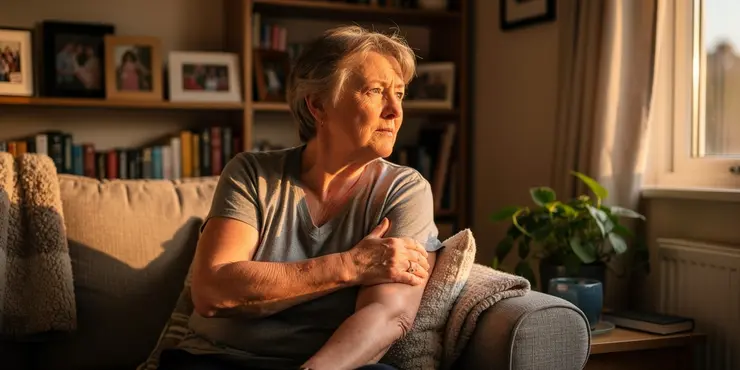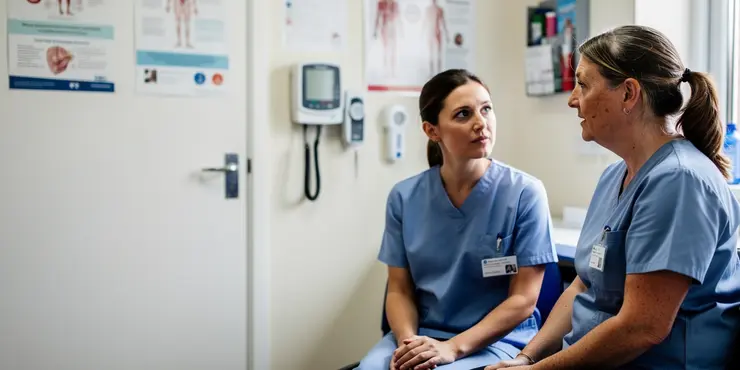Lymphoedema: Philippa's Story
Introduction to Lymphoedema
Lymphoedema is a chronic condition that occurs when the lymphatic system fails to function properly, causing swelling in the body's tissues. It most commonly affects the arms or legs but can occur in other parts of the body. It can develop as a result of cancer treatment, infection, or other conditions. Early diagnosis and treatment are crucial in managing the symptoms effectively.
Philippa’s Journey with Lymphoedema
Philippa, a resident of the United Kingdom, was diagnosed with lymphoedema following breast cancer treatment. After undergoing a mastectomy and lymph node removal, she began to notice persistent swelling in her right arm. At first, she assumed it was a temporary side effect, but the condition worsened over time.
Despite the challenges, Philippa sought help from her local NHS clinic. The healthcare professionals provided her with a comprehensive care plan that included manual lymphatic drainage, compression garments, and a tailored exercise regimen. These interventions were vital in reducing the swelling and managing her symptoms.
Managing Lymphoedema
Living with lymphoedema requires ongoing management. Philippa learned to incorporate specific daily routines to control her condition effectively. Wearing her compression sleeve became a part of her everyday life, as well as staying active through gentle exercises like swimming and yoga. She also emphasized the importance of skincare to prevent infections.
Support and Resources
The NHS provides a wide range of support and resources for individuals dealing with lymphoedema. Philippa found solace in joining a local support group where she could share her experiences and learn from others facing similar challenges. Such groups often provide emotional support and practical advice.
If you or someone you know is struggling with lymphoedema, consulting with NHS healthcare professionals can provide access to valuable resources and treatment options. Ensuring early intervention and consistent management can significantly improve the quality of life for individuals affected by this condition.
Conclusion
Philippa’s story highlights the importance of early diagnosis, consistent management, and the availability of support systems in handling lymphoedema. The NHS continues to play a crucial role in providing care and resources for those affected by this chronic condition. By following recommended treatment plans and engaging in support networks, individuals with lymphoedema can lead fulfilling lives.
Lymphoedema: Philippa's Story
What is Lymphoedema?
Lymphoedema is when parts of your body get swollen. This happens because a system in our body called the lymphatic system stops working well. It often happens in arms or legs, but can be in other places too. It can happen after things like cancer treatment or infections. It is important to see a doctor early to help with the swelling.
Philippa’s Story with Lymphoedema
Philippa lives in the UK. She got lymphoedema after she had breast cancer treatment. After her surgery, she noticed her right arm was swelling. At first, she thought it would go away. But it did not. So, she went to her NHS clinic for help.
The doctors helped Philippa with a care plan. She had treatments like gentle massages, wore special tight clothing, and did special exercises. This helped to reduce her swelling and helped her feel better.
How to Live with Lymphoedema
Philippa had to change her daily routine to help with her lymphoedema. She wore a compression sleeve every day. She also did gentle exercises like swimming and yoga to stay active. She took care of her skin to stop infections.
Getting Help and Support
The NHS offers help for people with lymphoedema. Philippa joined a support group to talk with others who have the same condition. These groups can give support and advice.
If you know someone with lymphoedema, NHS doctors can help with treatment and advice. Getting help early and taking care of the condition can make life better for people affected.
What We Learned
Philippa’s story shows why it is important to see a doctor early and to keep managing the condition. The NHS helps people with lymphoedema by providing care and support. By following doctor’s advice and joining support groups, people like Philippa can live happy lives.
Frequently Asked Questions
What is lymphoedema?
Lymphoedema is a chronic condition that causes swelling in the body's tissues, usually in the arms or legs. It occurs when the lymphatic system doesn't work properly.
What are the common symptoms of lymphoedema?
Common symptoms include swelling in parts of the body, a feeling of heaviness or tightness, restricted range of motion, aching, and hardening or thickening of the skin.
How was Philippa diagnosed with lymphoedema?
Philippa was diagnosed with lymphoedema following breast cancer treatment, which involved the removal of lymph nodes.
Can lymphoedema be cured?
Currently, there is no cure for lymphoedema, but it can be managed through various treatments such as compression therapy, exercise, and skin care.
What treatments are available for lymphoedema?
Treatments include compression garments, manual lymphatic drainage (a form of massage), exercise, skincare, and in some cases, surgery.
Why is skin care important for people with lymphoedema?
Good skin care is crucial to prevent infections, such as cellulitis, which people with lymphoedema are more prone to.
How did Philippa manage her lymphoedema?
Philippa managed her lymphoedema through a combination of compression garments, regular exercise, careful skin care, and manual lymphatic drainage.
Is exercise beneficial for people with lymphoedema?
Yes, regular exercise helps to improve lymph drainage and overall health. It's important to consult a healthcare professional for a suitable exercise program.
What role do compression garments play in lymphoedema management?
Compression garments help to reduce swelling by improving lymphatic and venous return and preventing fluid accumulation.
Can lymphoedema develop after cancer treatment?
Yes, lymphoedema is a common complication after treatments for cancer, particularly if lymph nodes are removed or damaged.
How often should compression garments be worn?
Compression garments should generally be worn daily, but specifics can vary. It's best to follow the advice of a healthcare professional.
Are there any lifestyle changes recommended for managing lymphoedema?
Maintaining a healthy weight, exercising regularly, avoiding infections, and being careful with skin care are important lifestyle changes for managing lymphoedema.
Are there support groups available for people with lymphoedema?
Yes, there are many support groups and resources available, including those provided by NHS and various charities.
What is cellulitis and why is it a concern for people with lymphoedema?
Cellulitis is a bacterial skin infection that can be serious for people with lymphoedema, as their immune systems might be compromised. Prevention and early treatment are crucial.
How can healthcare professionals assist in the management of lymphoedema?
Healthcare professionals can provide guidance on effective treatments, lifestyle modifications, and ongoing care strategies to manage lymphoedema.
What is lymphoedema?
Lymphoedema is when extra fluid builds up in your body and makes it swell. It usually happens in your arms or legs.
- The swelling can make your skin feel tight.
- Sometimes, it can be a bit uncomfortable.
- It is important to let a doctor or nurse know if you have this.
Here are some things that can help:
- Wear special socks or sleeves that fit tight.
- Move your arms and legs often.
- Drink lots of water.
Lymphoedema is a long-term problem. It makes parts of the body, like arms or legs, swell up. This happens because the lymphatic system, which helps keep body fluids balanced, isn't working right.
What happens when you have lymphoedema?
Lymphoedema makes a part of your body swell up. It often happens in arms or legs. Here is what you might feel:
- Your arm or leg gets bigger.
- Your skin feels tight or stiff.
- Your arm or leg feels heavy.
- You might have trouble moving your arm or leg.
Helpful Tips:
- Ask an adult you trust if you have any of these feelings.
- Show them this list to explain how you feel.
- They can help you find a doctor or nurse for more help.
Some common signs are:
- Body parts getting bigger, like swelling.
- Feeling heavy or tight in places.
- Cannot move as well.
- Ache or pain in some areas.
- The skin feels hard or thick.
For help, you can:
- Use picture charts to understand better.
- Ask someone to explain things simply.
How did Philippa find out she had lymphoedema?
Philippa got an illness called lymphoedema after she had treatment for breast cancer. The treatment included taking out some parts in the body called lymph nodes.
Can we make lymphoedema go away?
Right now, there is no way to make lymphoedema go away forever. But you can take care of it. You can use things like tight bandages, do special exercises, and take care of your skin.
What can help with lymphoedema?
Lymphoedema can make you swell up. Here are some things that can help:
- Exercise: Moving your body helps with swelling. Gentle exercises are good.
- Compression clothing: Special tight clothes can help stop swelling. A doctor can tell you more.
- Skin care: Keep your skin clean and dry. This stops infections.
- Massage: Rubbing your skin gently can help move the fluid.
Ask a doctor or nurse for more help. They can tell you what is best for you.
If reading is hard, try listening to a recording of the information. You can also ask someone to read it to you.
Ways to help include wearing tight clothes to help blood flow, a special kind of massage, moving your body, taking care of your skin, and sometimes, having an operation.
Why is looking after your skin important if you have lymphoedema?
People who have lymphoedema should take care of their skin. This is important because it can help stop infections.
If you have lymphoedema, your skin can get dry, cracked, or sore. It can make it easier for germs to get in and cause infections. These infections can make lymphoedema worse.
Here are some tips to help care for your skin:
- Wash your skin gently every day.
- Dry your skin well, especially in the folds.
- Put on a moisturizer to keep your skin soft.
- Use a mirror to look at your skin for cuts or scratches.
If you need help with your skin care, ask a parent or carer. You can also talk to your doctor or nurse.
Taking care of your skin is very important. It helps to stop infections, like cellulitis. People who have lymphoedema can get these infections more easily.
How did Philippa take care of her lymphoedema?
Philippa took care of her lymphoedema by doing a few important things. She wore special tight clothes, exercised often, looked after her skin, and got a special massage called manual lymphatic drainage.
Here are some tips that might help:
- Use reminders to help you remember to do exercises.
- Ask someone to help with putting on compression clothes if it’s hard.
- Use soft creams or lotions for gentle skin care.
- Try relaxation exercises like deep breathing to help feel calm and relaxed.
Is Exercise Good for People with Lymphoedema?
Let’s talk about exercise and lymphoedema. Lymphoedema is when your body holds extra fluid and causes swelling.
Exercise can be helpful. When you move, it helps the fluid in your body get back to normal. Here are some easy tips to help:
- Start with gentle exercises like walking or swimming.
- Move your arms and legs often to keep things flowing.
- Rest when you feel tired. Listen to your body.
- Ask a doctor or therapist for advice on good exercises for you.
Remember, it is always good to talk to your doctor before you start something new. There are also videos and classes that can help you learn. Doing exercise can make you feel better and stronger!
Yes, exercise can help your body get rid of waste and stay healthy. It's a good idea to ask a doctor about the best exercises for you.
How do tight clothes help with lymphoedema?
Tight clothes, called compression garments, can be important for people with lymphoedema. Lymphoedema makes parts of the body swell up. The tight clothes help stop the swelling.
They work by putting pressure on the swollen area. This pressure helps move extra fluid out of the body part so the swelling goes down.
If you have lymphoedema, a doctor might tell you to wear these tight clothes. It's important to wear the right size so they work well.
You can also ask for help from a health care worker. They can show you how to wear the clothes properly.
Compression clothes help stop swelling. They do this by helping blood and fluid move through the body, so it doesn’t get stuck in one place.
To better understand, you can use pictures, or ask someone to explain with simple words. It might also help to use videos that show how compression clothes work.
Can lymphoedema happen after cancer treatment?
Yes, lymphoedema can happen after cancer treatment.
Cancer treatment can hurt or remove some body tissues and lymph nodes. This can stop fluid from moving properly, causing swelling. This is called lymphoedema.
Here’s how to understand and manage lymphoedema better:
- Ask your doctor or nurse questions about it. They can help you learn more.
- Look for books or videos with pictures. They can make learning easier.
- Use apps or websites designed for easy reading.
If you notice swelling, tell your doctor. They can help you find ways to feel better.
Yes, lymphoedema can happen after cancer treatments. It is more likely if lymph nodes are taken out or hurt.
When should you wear tight clothes for support?
You should wear tight clothing, like compression socks or sleeves, every day. Ask your doctor to tell you what's best for you.
What changes can help if you have lymphoedema?
If you have lymphoedema, there are some easy things you can do to feel better:
- Move your body. Try to exercise a little every day.
- Keep your skin clean and safe from cuts and scratches.
- Wear clothes that do not press too tight on your body.
- Raise the swollen area when you can, like putting your leg or arm up on a pillow.
- If you feel unsure, ask a doctor or nurse for help.
There are also some things that might help:
- Compression garments (like special socks or sleeves) can help keep swelling down.
- Some people find gentle massage helpful.
- If you have a care team, they can show you other ways to help.
It is important to stay healthy if you have lymphoedema.
Here are some helpful tips:
- Keep a healthy weight.
- Exercise often.
- Stay away from infections.
- Take good care of your skin.
Using pictures or videos can help you remember these tips. You can also ask someone to remind you.
Can people with lymphoedema get help from support groups?
Yes, people with lymphoedema can join support groups. A support group is a place where you can talk to other people who have lymphoedema. You can share your feelings and get advice.
Joining a support group can help you feel better and learn more about living with lymphoedema. You can find support groups online or in your local area. Ask your doctor or nurse to help you find a group.
Yes, there are lots of support groups and help available. The NHS and different charities can help.
What is cellulitis and why is it a problem for people with lymphoedema?
What is cellulitis?
Cellulitis is a skin infection. It makes the skin red, hot, and sore. You might need medicine from a doctor to help it.
What is lymphoedema?
Lymphoedema is when your body has trouble moving fluid. This might make an arm or leg swell up.
Why is cellulitis a problem for people with lymphoedema?
People with lymphoedema have skin that is more open to germs. This makes it easier to get cellulitis. If you have both, talk to a doctor.
Helpful tips:
- Keep the swollen area clean.
- Tell your doctor if you see red, hot, or sore skin.
- Ask for help if you are worried or feel sick.
Cellulitis is a skin infection caused by bacteria. It can be serious for people with lymphoedema because their bodies might not be able to fight germs as well. Stopping it early and going to the doctor quickly is very important.
How can healthcare workers help with lymphoedema?
Healthcare workers are people who help us stay healthy. They can help with lymphoedema, which makes our arms or legs swell up.
Here are ways they can help:
- Show exercises: They can teach us simple exercises to help. These exercises move our arms or legs to reduce swelling.
- Use bandages: They might use special bandages to wrap around the swollen area to help it get smaller.
- Teach massage: They can teach us or someone else to gently massage the swollen area.
- Help with skin care: They can show us how to take care of our skin so it stays healthy.
- Suggest good clothes: They can tell us about clothes or stockings that can help with lymphoedema.
If you or someone you know needs help, always ask a healthcare worker. They are there to support you.
These are simple things you can do every day. Remember to talk to a healthcare worker for more help.
Doctors and nurses can help you find treatments that work. They can also give advice on changes you can make in your life to feel better and take care of lymphoedema.
Useful Links
This website offers general information and is not a substitute for professional advice.
Always seek guidance from qualified professionals.
If you have any medical concerns or need urgent help, contact a healthcare professional or emergency services immediately.
Some of this content was generated with AI assistance. We’ve done our best to keep it accurate, helpful, and human-friendly.
- Ergsy carfully checks the information in the videos we provide here.
- Videos shown by Youtube after a video has completed, have NOT been reviewed by ERGSY.
- To view, click the arrow in centre of video.
- Most of the videos you find here will have subtitles and/or closed captions available.
- You may need to turn these on, and choose your preferred language.
- Go to the video you'd like to watch.
- If closed captions (CC) are available, settings will be visible on the bottom right of the video player.
- To turn on Captions, click settings .
- To turn off Captions, click settings again.





